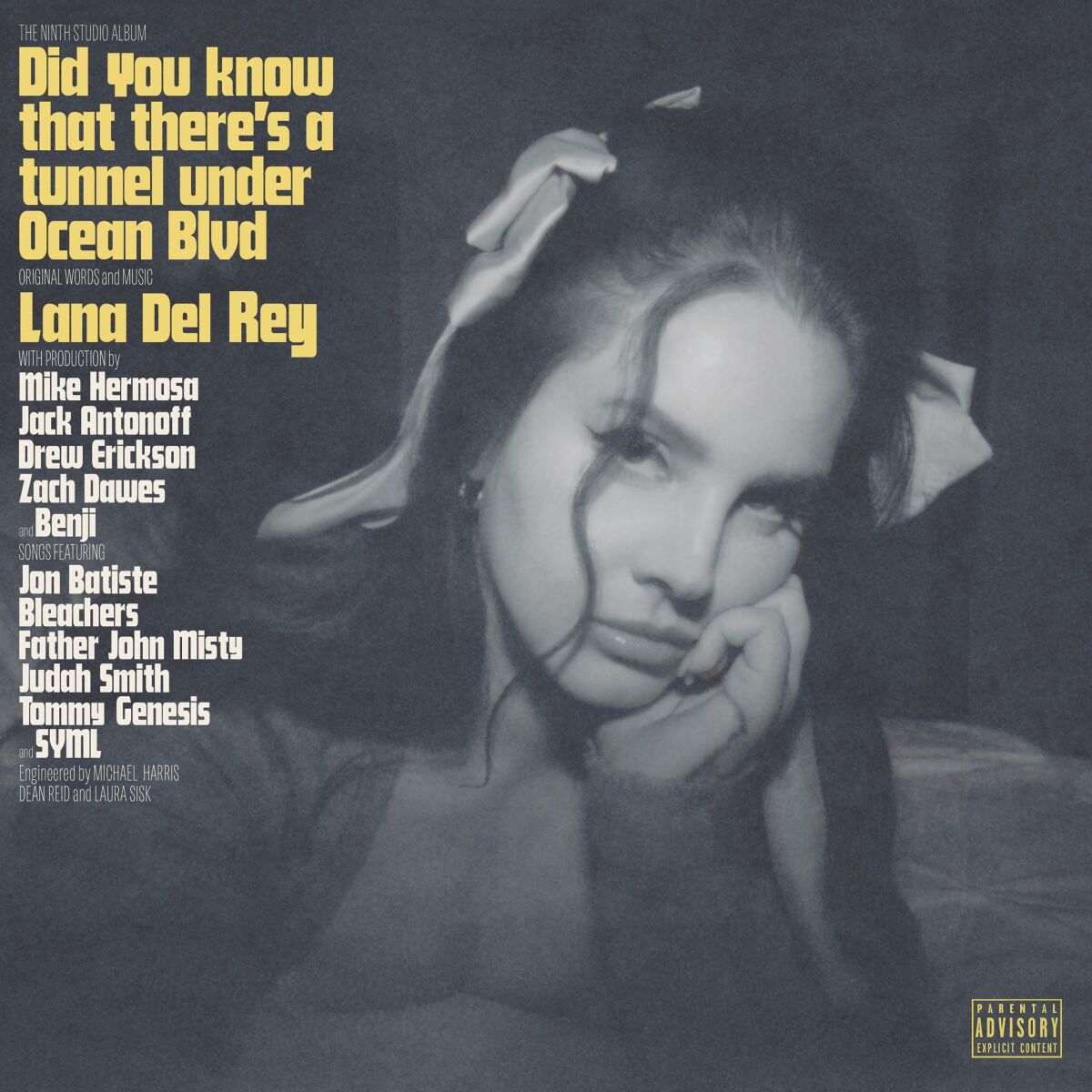Lana Del Rey’s sprawling and obsessive new LP — “the ninth studio album,” as its cover describes it in a flourish of self-mythologizing graphic design — is the one where this great American collage artist begins cut-and-pasting herself.
Known since she emerged over a decade ago for alluding to or borrowing from the music of Lou Reed, Nancy Sinatra, Joni Mitchell and the Beach Boys, among countless others, Del Rey here quotes a line from her own song “Cinnamon Girl” and repurposes a string arrangement from her “Norman F—ing Rockwell” before concluding the record with a luscious-spooky dub-trap remake of 2019’s “Venice Bitch,” in which she rhymes “Get high” with “Never die” and “Drop acid” with “Lake Placid.”
And why not? At age 37, Del Rey has ascended to a level of prestige that for her younger inheritors — including famous fans like Billie Eilish and Olivia Rodrigo — more or less matches the esteem in which she holds those in her pantheon; what’s more, she’s almost equally revered by musicians from the generation before hers: Stevie Nicks, who appeared on Del Rey’s 2017 “Lust for Life”; Cat Power, who’s covered her “White Mustang”; and Courtney Love, who recently told Marc Maron that Del Rey and Kurt Cobain are “the only two true musical geniuses I’ve ever known.”
Consider that as the new album arrives — it’s called “Did You Know That There’s a Tunnel Under Ocean Blvd,” in reference to a long-forgotten underground passageway in Long Beach — Del Rey’s 2012 major-label debut, “Born to Die,” is in its 475th week on the Billboard 200, one indication of a cultural endurance few envisioned back when that album was inspiring skeptical takes about Del Rey’s artistic authenticity.
And yet the self-canonizing she undertakes on “Ocean Blvd” isn’t merely a flex (though she does do a bit of told-you-so-ing regarding those old criticisms, as when she sings sarcastically of “big men behind the scenes sewing Frankenstein black dreams into my songs”). Rather, her summoning of Lanas past is a way to frame a work of determined introspection on which she’s taking stock of the social and emotional forces that shaped her ideas about family, marriage, art, motherhood, sex, celebrity and death — “the stuff that’s at the very heart of things,” as she puts it in “Sweet.”
Indeed, the scope of her examination is so broad that her count of nine studio LPs includes a little-heard 2010 indie project released under the name Lana Del Ray (note the slightly different spelling); “Ocean Blvd’s” opener, “The Grants,” points back even further, to her upbringing in Lake Placid, N.Y., as Elizabeth Grant.
“My pastor told me when you leave, all you take is your memory,” she sings, haunted yet blissed-out, over churchy piano chords, “And I’m gonna take mine of you with me.”
Del Rey isn’t the only A-list pop star engaging in this type of personal history. “Endless Summer Vacation,” by another of her admirers, Miley Cyrus, has a similar my-back-pages energy, while Taylor Swift — who recruited Del Rey for a cameo on last year’s “Midnights” and with whom she shares a key studio collaborator in Jack Antonoff — just launched a blockbuster stadium tour built to showcase a succession of former selves.
But Del Rey’s thinking, and by extension her songwriting, is the deepest and most penetrating. On “The Grants,” she ponders the comforts and obligations of being a daughter and a sister; “Fingertips” recalls the tragic deaths of an uncle and a high school crush and explores the singer’s troubled relationship with her mother. Del Rey muses on romance in “Let the Light In,” a country-ish duet with Father John Misty, and the tender “Margaret,” which she wrote about Antonoff’s engagement to the actor Margaret Qualley.

Lana Del Rey’s new LP, “Did You Know That There’s a Tunnel Under Ocean Blvd.”
(Interscope Records)
“A&W,” whose title abbreviates “American whore” even as it knowingly evokes the nostalgic fast-food chain, takes up Del Rey’s complicated performance of gender with startling candor: “If I told you that I was raped, do you really think that anybody would think I didn’t ask for it?”
Line by line, her lyrics deliver a staggering blend of the profound and the vernacular, as in “Candy Necklace,” where she’s “sitting on the sofa, super-suicidal / Hate to say the word, but, baby, hand on the bible, I do.” Savor the intricate rhythms in those words! And behold her skill as a phrase-maker: “You’re so funny, I wish I could skinny-dip inside your mind,” she tells somebody in “Fishtail”; “I’m a different kind of woman,” she declares in “Sweet,” “If you want some basic bitch, go to the Beverly Center and find her.”
At 77 minutes in length, “Ocean Blvd” risks tiring the listener’s ear, which is why Del Rey and her co-producers — Antonoff along with Drew Erickson, Zach Dawes and Mike Hermosa — keep folding unexpected sounds and textures into the album’s largely piano-based arrangements. “The Grants” has lush gospel-choir background vocals; “Fishtail” has squirmy synths reminiscent of those on Swift’s “Midnights”; “Peppers” and “Taco Truck x VB” have the kind of bleary hip-hop beats that Del Rey mostly stayed away from on the folkier albums that followed “Lust for Life.”
But even at its most stripped-down, as on “Fingertips” and the desperately pretty “Paris, Texas,” Del Rey’s richly expressive singing holds your attention in part because you’re never quite sure where her slowly unwinding melodies will go. In a recent chat with Eilish in Interview magazine, Del Rey described her approach on “Ocean Blvd” as “straight vibing,” and the result can remind you of the way SZA illuminates a mysterious interior world on “SOS.”
Del Rey’s inward focus doesn’t mean she’s stopped using her music to map the dense web of connections that is life in the digital era. These songs are bursting with samples and suggestions and shout-outs: On “Peppers,” she and her boyfriend are listening to the Red Hot Chili Peppers and dancing to the surf-rock classic “Wipe Out,” while “Kintsugi” nods to Leonard Cohen’s famous line about the light getting in through a crack in everything.
Del Rey herself doesn’t even sing on “Judah Smith Interlude,” a 4½-minute excerpt from a sermon by the controversial pastor to the stars who also counts Justin Bieber among his flock. Yet the way Del Rey presents it, as an apparent voice recording captured on her phone, we’re hearing Smith not at the pulpit but from what sounds like a pew at his megachurch; she shifts in her seat, murmurs in assent, laughs now and then whether or not Smith was making a joke. He’s got the mic, but the moment is hers.
Stay connected with us on social media platform for instant update click here to join our Twitter, & Facebook
We are now on Telegram. Click here to join our channel (@TechiUpdate) and stay updated with the latest Technology headlines.
For all the latest Music News Click Here

